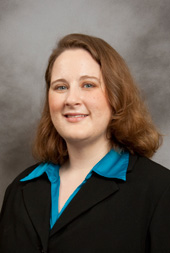 Occasionally scholars develop a love for a period of history or literature at a very early age and that interest blossoms into a lifetime of research. Such is the case with Lander University assistant professor of English Dr. Lillian Craton.
Occasionally scholars develop a love for a period of history or literature at a very early age and that interest blossoms into a lifetime of research. Such is the case with Lander University assistant professor of English Dr. Lillian Craton.
"I started reading Jane Austen in elementary school and just never looked back," said Craton, adding that she has a love for Victorian literature in general. "Charlotte Bronte's 'Jane Eyre' has been my favorite book since middle school and I've just followed this childhood passion as far as it would go."
How far has this passion taken her? Most recently Craton's research of Victorian literature brought her recognition by her peers when she became the 2010 recipient of Lander's Young Scholar Award - an award granted to a new Lander faculty member with the best record of scholarship and who exemplifies the qualities the Lander faculty values in its colleagues as teacher-scholars.
What likely won Craton this recognition was the publication of her book, "The Victorian Freak Show: The Significance of Disability and Physical Differences in 19th Century Fiction." Published in 2009 by Cambria Press, the book examines Victorian fiction from the vantage point of a new field of literary research Craton says is commonly referred to as Disability Studies.
"In particular, it examines how novelists like Dickens, Wilkie Collins and Florence Marryat employ imagery of odd bodies that was floating around in Victorian culture because of the popularity of freak shows in 19th century England," said Craton. "The book argues that these images are sometimes used in an exploitive way - like freak shows themselves - but, surprisingly, are sometimes reimagined in positive ways that make Victorian culture more inclusive."
Craton explained that her interest in Disability Studies began with a professor she had while attending graduate school at Emory University. According to Craton, this professor, Rosemarie Garland-Thomson, is one of the foremost Disability Studies scholars in the country. It was Garland-Thomson's influence that led Craton to write a paper that would solidify her interest in this new area of Victorian research and ultimately become one of the chapters in her book.
"One of the challenges of being a Victorianist, and being interested in one of those truly loved periods of literature, is that it's hard to find new avenues of research that haven't been explored," said Craton. "Disability Studies is a blossoming field. It's only a few decades old and there is still a lot of innovative work that's being done. This topic was my chance to find something new that I can marry to my longtime love of the Victorian period."
Beyond the publication of her book, Craton has recently published an essay, which she co-wrote with a former student, titled "I Am Sookie, Hear Me Roar: Sookie Stackhouse and Feminist Ambivalence," and which was included in the book "True Blood and Philosophy: We Wanna Think Bad Things with You."
In addition to being a published scholar, Craton is, of course, a teacher. She is taking her experience as a writer and passing it on to Lander students, and she is conveying this knowledge in some very unique ways.
For one of the projects in her freshman composition classes, Craton has students record a podcast using their own writing as the script. The lesson includes listening to NPR shows such as "This American Life," and is meant to give students a different method of personal critique. "I think radio is more connected to the writing process than TV or movies because you can focus on the language and you're not so overwhelmed with the visual imagery," said Craton. "Students, especially new college writers, need to take a moment and listen to how their writing sounds."
With the podcasting project, students are tasked with writing a feature news article about people connected to the Lander community, then making a recording of themselves reading it. Some of Craton's students have even added music to their recordings and used actors to read the parts. She says that the project gets students to face what sounds good and what sounds bad about their writing. "I have students come and say, 'This sounds awful. I started reading my paper and just had to go back and start over,'" she said. "And as much as that can be a sad moment for the student, it's actually a happy moment for the teacher because it means that person is looking realistically at what's working and what's not working in their writing style."
Some of the podcasts generated through Craton's lesson have been aired on Lander's student radio station, XLR Lander Radio, and they have been posted to the online student news site, www.landerforum.com. According to Craton, this part of the process gives students a real audience to speak to in their writing. "It shows students that what they are doing is important and that people are interested and care about it," she said.
In addition to her 2010 award, Craton was the 2009 recipient of Lander's Young Faculty Teaching Award. The Georgia native holds a master's and a doctorate degree from Emory University and a bachelor's degree from the University of North Carolina.
On the topic of her recent award, Craton said, "This was such an unexpected honor. One of the great things about having these kinds of awards in place is that it invites faculty to talk about scholarship. We do have a really vibrant scholarship community, and it's nice to see that activity get attention and recognition by the university."